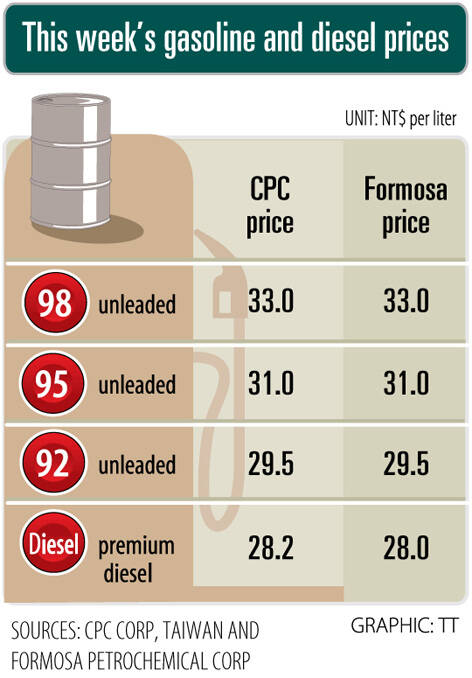Domestic gasoline prices are to drop NT$0.6 per liter this week after international crude oil prices fell last week, as weakening manufacturing activities in China and the US and the prospect of slowing energy demand weighed on market sentiment, CPC Corp, Taiwan (CPC, 台灣中油) and Formosa Petrochemical Corp (台塑石化) said in separate statements yesterday.
Other factors included news that Libya would resume production at its eastern oil fields and restart exports.
Worries about geopolitical tensions also led traders to become more bearish about the overall market outlook, sending oil prices lower, the companies said.

Saudi Arabia cut the price of its flagship crude grade for its main market in Asia by US$0.7 to US$1.30 a barrel next month as concerns mounted over waning demand, Bloomberg News reported on Saturday.
It also cut prices for its crude exports to northwest Europe by about US$0.8 a barrel across grades and trimmed prices for oil to North America by US$0.10 a barrel, the report said.
CPC said that based on its floating oil price formula, the cost of crude oil fell 3.82 percent last week from a week earlier.
Effective today, gasoline prices at CPC and Formosa stations are to decrease to NT$29.5, NT$31 and NT$33 per liter for 92, 95 and 98-octane unleaded gasoline respectively, the companies said.
However, premium diesel would rise NT$0.3 to NT$28.2 per liter at CPC stations and cost NT$28 at Formosa pumps, they said.

Nvidia Corp CEO Jensen Huang (黃仁勳) today announced that his company has selected "Beitou Shilin" in Taipei for its new Taiwan office, called Nvidia Constellation, putting an end to months of speculation. Industry sources have said that the tech giant has been eyeing the Beitou Shilin Science Park as the site of its new overseas headquarters, and speculated that the new headquarters would be built on two plots of land designated as "T17" and "T18," which span 3.89 hectares in the park. "I think it's time for us to reveal one of the largest products we've ever built," Huang said near the

China yesterday announced anti-dumping duties as high as 74.9 percent on imports of polyoxymethylene (POM) copolymers, a type of engineering plastic, from Taiwan, the US, the EU and Japan. The Chinese Ministry of Commerce’s findings conclude a probe launched in May last year, shortly after the US sharply increased tariffs on Chinese electric vehicles, computer chips and other imports. POM copolymers can partially replace metals such as copper and zinc, and have various applications, including in auto parts, electronics and medical equipment, the Chinese ministry has said. In January, it said initial investigations had determined that dumping was taking place, and implemented preliminary

Intel Corp yesterday reinforced its determination to strengthen its partnerships with Taiwan’s ecosystem partners including original-electronic-manufacturing (OEM) companies such as Hon Hai Precision Industry Co (鴻海精密) and chipmaker United Microelectronics Corp (UMC, 聯電). “Tonight marks a new beginning. We renew our new partnership with Taiwan ecosystem,” Intel new chief executive officer Tan Lip-bu (陳立武) said at a dinner with representatives from the company’s local partners, celebrating the 40th anniversary of the US chip giant’s presence in Taiwan. Tan took the reins at Intel six weeks ago aiming to reform the chipmaker and revive its past glory. This is the first time Tan

CUSTOMERS’ BURDEN: TSMC already has operations in the US and is a foundry, so any tariff increase would mostly affect US customers, not the company, the minister said Taiwanese manufacturers are “not afraid” of US tariffs, but are concerned about being affected more heavily than regional economic competitors Japan and South Korea, Minister of Economic Affairs J.W. Kuo (郭智輝) said. “Taiwan has many advantages that other countries do not have, the most notable of which is its semiconductor ecosystem,” Kuo said. The US “must rely on Taiwan” to boost its microchip manufacturing capacities, Kuo said in an interview ahead of his one-year anniversary in office tomorrow. Taiwan has submitted a position paper under Section 232 of the US Trade Expansion Act to explain the “complementary relationship” between Taiwan and the US